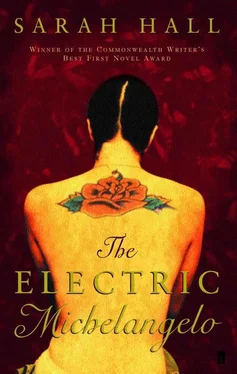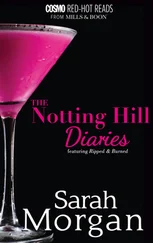Sarah Hall - The Electric Michelangelo
Здесь есть возможность читать онлайн «Sarah Hall - The Electric Michelangelo» весь текст электронной книги совершенно бесплатно (целиком полную версию без сокращений). В некоторых случаях можно слушать аудио, скачать через торрент в формате fb2 и присутствует краткое содержание. Год выпуска: 2010, Издательство: Faber and Faber, Жанр: Современная проза, на английском языке. Описание произведения, (предисловие) а так же отзывы посетителей доступны на портале библиотеки ЛибКат.
- Название:The Electric Michelangelo
- Автор:
- Издательство:Faber and Faber
- Жанр:
- Год:2010
- ISBN:нет данных
- Рейтинг книги:3 / 5. Голосов: 1
-
Избранное:Добавить в избранное
- Отзывы:
-
Ваша оценка:
- 60
- 1
- 2
- 3
- 4
- 5
The Electric Michelangelo: краткое содержание, описание и аннотация
Предлагаем к чтению аннотацию, описание, краткое содержание или предисловие (зависит от того, что написал сам автор книги «The Electric Michelangelo»). Если вы не нашли необходимую информацию о книге — напишите в комментариях, мы постараемся отыскать её.
The Electric Michelangelo — читать онлайн бесплатно полную книгу (весь текст) целиком
Ниже представлен текст книги, разбитый по страницам. Система сохранения места последней прочитанной страницы, позволяет с удобством читать онлайн бесплатно книгу «The Electric Michelangelo», без необходимости каждый раз заново искать на чём Вы остановились. Поставьте закладку, и сможете в любой момент перейти на страницу, на которой закончили чтение.
Интервал:
Закладка:
There was a quality of susceptible stray animal to her as well as a smartness of mouth and a propensity for backchat. She tuned the radio to howling punk rock that gave Cy a headache and laughed at his records and cassettes of jazz and swing, saying he was an old relic who should be put in a museum. She nagged him constantly to cut his long hair and take out his ear-ring, reminding him so completely of Den Jones that he expected to walk outside during one of her lectures into the Brooklyn light and see the turrets of Coney Island puncturing the horizon in the distance and hear that faraway, once-upon-a-time hum of amusement park paradise and hell. She told unwelcome stories of getting with boys exactly to her liking in the grottos of the bay and the roller disco that made Cy blush and falsify coughing fits so he could leave the room. Sex was, in her book, a topic entirely open for discussion. Mostly she asked an endless drill of questions whose punches were seldom pulled and whose shameless promotions were never hidden. Why did he do this? Why did he do that? Why should she have to learn about motors and coils and welding and silly little gippy oily shitty parts when the stuff could be ordered out of a catalogue? What was so special about blue bloody ink and just what had he had to do with it all anyway? How did he get his gammy leg? Where were his medals? Did he believe in boggarts? Didn’t he think this boy really liked her because he’d given her a kiss down-you-know-where, or that lad was a dickhead because he thought women shouldn’t drive forklifts at the sausage factory? Shouldn’t tampons be available on the NHS and didn’t he think that if men had to have the curse of Eve every month they would be? Didn’t America seem like a marvellous country on the telly or at the pictures where everybody’s problems got sorted out and they were all happy? Why wasn’t he married? Was he queer? Why, and this question really intrigued her, did he always talk about love like there was an empty chair next to him at whatever table he sat?
Occasionally Cy lost his rag, and yelled at her to shut up. But the raised voice fitted so perfectly and so sinisterly within the walls of the parlour, like a fist in a glove, or a pickaxe in a splintered trunk, that it shook him at his core and his outbursts never lasted more than a few moments. She required few apologies to resume her conversation. And though by the end of the day he often felt exhausted and irritated by her unrepentant, iridescent, volatile company, or like he was sloshing full and heavy with her mental bilge and sinking slowly, the shop was always a little too quiet after she had gone.

— Can I start piercing folk?
— No you bloody can’t. Not in my shop. It’s gimmickry. It´s for people who don’t understand the craft.
Nina tutted loudly and tossed out the remaining inch of leafy tea from her cup into the sink. Cy was reading a book in his room, with his leg up on a stool, waiting for a customer to appear. This was an argument they had had before.
— It´s not fair. You wouldn’t even have to do any of the work. I could be in charge of it.
— Oh, it’s always lip from you, isn’t it? Never a moment’s peace. Does it say Nina Shearer’s tattoo parlour on that sign up there? Does it?
— Fascist.
Cy smiled and looked up from his book at her.
— Speaking of, have you been to the polling station yet today, missy? Have you voted?
— No. They’re all a bunch of great fat farts, why should I bother?
— Listen. I don’t care if you never put a single tick in a single box, but you get yourself down that polling station right now. You’ve got your voting card?
— Yes. But why the bloody hell should I go if I’m not ticking any boxes? You’ve gone soft in the head.
— Well, go and write ‘you’re all a bunch of great fat farts’ across it and hand it in! At least they’ll know you’ve been there and had your say.
Nina was giving him a look of bemused pity, as if commiserating with his insanity, his obviously retarded condition. Or as if he had suddenly grown another head. And damn it if Cy didn’t want to kick her up the backside and give her a hug both at once.
— All I’m saying, pet, is that you shouldn’t take these things for granted. That’s all. Now off you go.

With almost no effort at all on nature’s part and before Cy knew it, it was September again. That time of year when powerful news was broken to unsuspecting Lancashire lads and the clash of seasons brought unrest in the nether regions of the human spirit. A time when the women Cy had loved most dearly in his life had taken a step back into themselves in preparation for solitary struggles and departure. But he was as far away on the calendar from the anniversary of Eliot Riley’s demise as he could be and that was a favourable place to be. Cyril Parks was not unhappy. The days had that blue hue to them, with the rush of water along their sides, and they were refreshing. A storm in the night had tossed up timber and treasure in his dreams and he had seen his old booth spinning on the alleyway, oversized chess pieces were dancing with each other in Varga, Reeda was smoking an opium pipe made from a shell at the Bayview’s kitchen table with Riley, Jonty was kissing nurses in the war. And he had seen Grace, on horseback, riding fast across the open sands of the bay, standing up in her stirrups as if she might leap from the horse as she rode on into the ocean. His blood had been exhilarated when he woke, fiery, like electricity. And he felt young again. That morning he had walked along the path by the ravine, feeling the wind kiting his coat, pushing back against him, pushing him upright and straightening the bend in his long spine. His leg had not hurt so very much when usually it provided nothing but a deep dull ache in the steel-shanked bone. The air had been saturated with that unmistakable salty tonic that only coastal regions have, and he drew deep lungfuls down into him, laughing because it was unnecessary, because he didn’t have tuberculosis. He thought of Grace on the walk, the dark borders of her against which the lighter colours and aspects shone. He thought of her dark hair with its red undertraces, her hands gently pushing against the tattooed ship on his stomach as if she was launching what it carried, a heart pierced by a tall mast, and the way she always called him by his moniker, as if identity was only a matter of choice. He thought of her eyes, both real and tattooed, and he knew that she had never truly left him, not in the way old loves are eventually reconciled or abandoned. Somewhere in the world she was still living perhaps, still raging, and though he wouldn’t like the job of painting it, the world was getting smaller by the day, the corners around which she might walk were getting closer. She was subjective and brief and random in his life, but she was still strong in him, and interlocking, like crystal in stone, like roots in the earth. And his heart was densely occupied and his soul was lying fallow. It was why he had never married, it was why whenever his apprentice told him some unkown lady had called for him in the shop, his stomach always dropped and lurched. And it was why he had never taken away that empty chair of Nina’s remarking, even while courting others, even while getting near to that honest place where he should think about the possibilities of dying.
When he returned home he looked through some of his stored possessions, usually it made him feel old to do so, but not today. There was a dime entry ticket to Luna Park, some old British money, photographs, a sentimental beer mat from the pub where he and Morris Gibbs had taken tea together after he first arrived back in the town, and then he had come across his oldest mermaid. She was brown around the edges and the ink was fading so that her fins appeared orange-tipped, not red, and the green of her tail was dappled. He could remember making her with his set of school paints, keeping her flat in a book through all the years that Riley would not allow her up, and he could remember the skin of the men, and some women, on to which she had finally been transferred by his needle. He had said over and over that she was unique but he did not really know if she was so very different from the others.
Читать дальшеИнтервал:
Закладка:
Похожие книги на «The Electric Michelangelo»
Представляем Вашему вниманию похожие книги на «The Electric Michelangelo» списком для выбора. Мы отобрали схожую по названию и смыслу литературу в надежде предоставить читателям больше вариантов отыскать новые, интересные, ещё непрочитанные произведения.
Обсуждение, отзывы о книге «The Electric Michelangelo» и просто собственные мнения читателей. Оставьте ваши комментарии, напишите, что Вы думаете о произведении, его смысле или главных героях. Укажите что конкретно понравилось, а что нет, и почему Вы так считаете.












